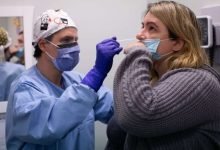Ontario reports 483 new COVID-19 cases, bringing total to 5,759
Ontario confirmed 483 new cases of COVID-19 on Thursday and 4,097 more tests done since the last update, considerably less than the province’s daily capacity of 13,000 tests per day.
The new cases bring the province’s total to 5,759, including at least 215 deaths, according to a count by CBC News.
Some 2,305 cases are considered resolved, or about 40 per cent of Ontario’s total COVID-19 cases.
Another 1,208 people are awaiting test results.
The province is also reporting 69 outbreaks of COVID-19 at long-term care homes.
Of the 632 cases that are hospitalized:
- 264 are in intensive care units.
- 214 are on ventilators.
Today’s update represents a snapshot of COVID-19 cases in Ontario as of 4 p.m. Wednesday.
Updated testing guidelines
Meanwhile Ontario’s chief medical officer of health says in a new memo that all health-care workers and first responders should be tested for COVID-19 as soon as they develop any symptoms, even atypical ones.
Dr. David Williams also says that anyone newly admitted to a long-term care home should be tested, as well as residents — even asymptomatic ones — who have had contact with a confirmed case.
The expanded guidance stops short of a call Premier Doug Ford issued Wednesday for every long-term care resident, front-line health-care worker and first responder to be tested.
Ford was expressing frustration over the number of daily COVID-19 tests performed in Ontario falling well short of its lab processing capacity.
Williams’ memo says testing of asymptomatic patients, residents or staff is generally not recommended.
The province’s top doctor has also issued a new directive to long-term care homes requiring all staff and essential visitors to wear masks while they are in those facilities, whether there is an active outbreak or not.
Ford is scheduled to hold his daily news conference at 1 p.m. His office says he will be joined by Health Minister Christine Elliott, Finance Minister Rod Phillips and Peter Bethlenfalvy, treasury board president.
10 low-risk offenders released
The office of Ontario’s solicitor general told CBC News Thursday that between April 2 and 8, 10 low-risk offenders nearing the end of their sentences were released from custody in the province’s jails with temporary absence passes.
Some legal groups and activists have been calling for governments to release non-violent inmates to help stop the spread of COVID-19 in prisons and jails.
Sylvia Jones’ office said that the released offenders include:
- Five inmates from Central North Correctional Centre in Penetanguishene.
- Two inmates from Central East Correctional Centre in Lindsay.
- One inmate each from Kenora Jail, the Niagara Detention Centre and Monteith Correctional Complex in Iroquois Falls.
The ministry says it has also given temporary absence passes to intermittent offenders, who would normally spend weekends in custody.
‘Dynamic’ social distancing an option?
A new study suggests toggling physical distancing measures up and down could be a way of sustaining the long-term fight against COVID-19 without crushing the economy.
Scientists from the University of Toronto and the University of Guelph used mathematical modelling to predict the course of the disease in Ontario.
The research suggested so-called “dynamic” physical distancing could help keep the health-care system from becoming overwhelmed.
It would also allow: “periodic psychological and economic respite for populations,” the researchers say.
Six Nations reports COVID-19 death
A First Nation in southwestern Ontario says one of its members has died of COVID-19.
Six Nations of the Grand River’s elected chief, Mark Hill, says the community is grieving the death.
The First Nation says there are eight coronavirus cases on the reserve.
It had its first confirmed case two weeks ago.
Six Nations declared an emergency on March 13 and has set up checkpoints to restrict access to the territory.
Hill says the community must increase its efforts to slow the spread of the disease and to stay home.
“Given the increased risk of mortality within First Nations communities, we’ve been trying to prepare for this, but you never really can, can you?” Hill said in a statement.
“When this is all over, we will hold each other close. But right now, we need to show unimaginable strength and do everything in our power to ensure we do not lose anymore lives.”
CBC








Redes Sociais - Comentários